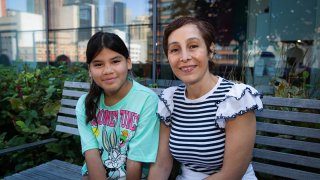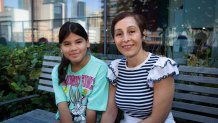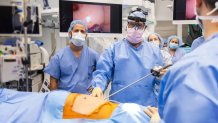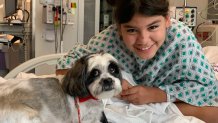
When Margarita Martinez picked up daughter Fernanda after summer camp in August 2022, she had a cough. The two hoped to sightsee in New York City before returning home to Mexico City. But a day later, Fernanda woke up sick, and instead they visited an urgent care clinic.
“She was feeling really bad,” Martinez tells TODAY.com. “They did a COVID test. It was negative." But the urgent care providers noticed Fernanda's blood-oxygen level was low, so they recommended the mom and daughter go to the emergency room.

The Martinez family didn’t know where to go, and they looked at the list of hospitals from the urgent care clinic and picked the first one: Hassenfeld Children’s Hospital at NYU Langone.
Get DFW local news, weather forecasts and entertainment stories to your inbox. Sign up for NBC DFW newsletters.
“By the time we got there, she was already crashing,” Martinez says. “They were trying to get her oxygen levels up.”
She was tested again for COVID-19 and tested positive — it the first time anyone in her family had had it. But doctors didn’t think it was the cause of Fernanda’s dramatic decline. They soon learned what was to blame: a rare, cancerous tumor on her trachea.
“They came back on Sunday and said, ‘It’s definitely something and it’s very big,’” Martinez says.
Health Connection
Get connected to a healthier life.
Cough quickly becomes worse
The summer camp told Martinez that her daughter had a “cold,” but her cough quickly worsened while sightseeing in New York City. After they arrived at the hospital, doctors rushed to stabilize her and gave her medicine to treat her COVID-19 after her positive test.
“She reacted positively to the medicine. They started to take her off the oxygen, and they told me probably by Sunday she can leave,” Martinez says. “She relapsed really badly. She started to crash again. She couldn’t breathe. She became super anxious because she felt like she was just not able to breathe at all, like she was asphyxiating.”
Doctors gave her stronger medications and increased the amount of oxygen she received. While she started to improve, doctors noticed she had a pneumothorax, air outside the lungs in the chest cavity.
“It’s very dangerous,” Martinez says.
Doctors performed a CT scan and noticed something.
“She has something in her trachea,” Martinez recalls them telling her.

Doctors wanted to keep her in the hospital, and suddenly Martinez met a slew of specialists, including an adult cardiothoracic surgeon who explained what he was going to do to remove the mass. The surgery included putting Fernanda on ECMO, a form of life support, which scared Martinez.
“That’s when I understood that they were basically going to cut off part of the trachea … which is where the tumor was, and they would pull the trachea together,” she says. “The trachea would regenerate, which I didn’t know that was possible.”
A multidisciplinary approach for a complicated case
Dr. Eleanor Muise first encountered Fernanda in the pediatric intensive care unit soon after the girl was admitted.
“Her COVID infection was not very severe,” Muise tells TODAY.com. “There are many other symptoms that may go along with COVID that she did not necessarily have.”
When doctors realized Fernanda had a pneumothorax, they ordered more tests to understand why.
“It’s not terribly common, and we wanted to make sure we weren’t missing something underlying we did not yet know about," Muise explains. "When her chest CT was performed, it revealed she had a large mass obstructing her trachea. This helped to put the pieces of a puzzle together.”
Finding the mass was “unexpected” because “this type of tumor is unusual in childhood,” Muise says. That meant they needed to consult with their colleagues who treat adults.
“Our adult colleagues in interventional pulmonary are more familiar with acting upon masses within the trachea because they are so rare in childhood,” she says. “It was a natural connection to work with them to biopsy and reduce the bulk (of the mass) tremendously.”
That’s when Dr. Robert Cerfolio joined the treatment team. Cerfolio has removed such masses in adults using minimally invasive robotic surgery. Otherwise, the surgery can require splitting the sternum open, breaking the ribs and sewing them back together, which can take six months or longer to recover. Using the robotic device creates much smaller incisions and takes less time.
“It’s a completely different experience," Cerfolio, chief of clinical thoracic surgery, at NYU Langone Health, tells TODAY.com.

To perform the surgery, Cerfolio needed the assistance of the ECMO team so they could divert Fernanda’s breathing while he removed the mass and repaired her trachea. Dr. Jason Fisher oversaw the ECMO.
Doctors often use ECMO for patients who are struggling to get “enough blow flow or oxygen to their body, usually due to some severe but revisable illness,” Fisher explains, and ventilators alone can’t help because the patient’s lungs are so weak.
“That was not the case. Fernanda’s lungs were fine,” Fisher says. “We had an idea that maybe we could allow Dr. Cerfolio to work very freely without worrying that he was interrupting the air flow to the patient.”
Cerfolio removed the mass and reconnected the trachea during the surgery by going through small incisions in Fernanda’s back.
Fisher explains that disease that caused Fernanda's mass, aka the pathology of it, was "somewhat unique, and it’s not a common tumor in children or quite frankly ... adults. We are very familiar with airway issues and lesions in children … but at the end of the day, it was a tumor that we don’t see a lot.”
Going home
Throughout Fernanda’s health scare, Martinez was in New York City alone. While it was stressful at times, Martinez felt she had a lot of support from loved ones from afar. When Fernanda first woke after surgery, she was in pain. But that soon changed.
“After two days, she was like a different child. She was much better. It was still a bit painful,” Martinez says. “She was able to start walking around.”

Still, Fernanda’s left lung was not fully inflating, and doctors tried various therapies to help her. When she was discharged five weeks after first going to the hospital, she needed to do breathing therapy. While the family felt excited to return home to Mexico City, there was a catch. Fernanda’s pneumothorax meant she couldn’t fly, and they had to drive back, which took five days. Mexico City’s elevation also slowed her recovery.
“Because the city is so high up, she wasn’t able to do any exercise for three more weeks,” Martinez says. “The moment she started exercising, she recuperated her lung capacity very, very quickly.”
After about six weeks, Fernanda returned to the sports she loves, tennis, gymnastics and aerial acrobatics. To make sure the cancer hasn’t returned, she’ll need to undergo a bronchoscopy, where doctors use a scope to look at her airway. Martinez hopes their story encourages parents to be mindful of their children’s health.
“If something changes in your child, you have to pay attention even if it’s just a minimal thing," she says.
This story originally appeared on TODAY.com. More from TODAY:




